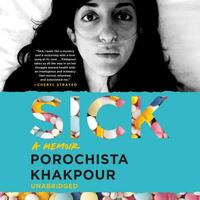You need to sign in or sign up before continuing.
Take a photo of a barcode or cover
I kept reading this book in the hopes that the author would realize how contradictory she was. I don’t think she ever did. So many pages of medical professionals telling her she may have Lyme, to pursue this possibility, yet she goes on for years without doing so. And is constantly surprised, and surprisingly dismissive, when it keeps being mentioned. Another page toward the end she brings up a Lyme relapse and says she hadn’t expected any relapses in the future, yet in the following paragraph she clearly states that she had been warned this would happen.
I personally understand the frustrations of never feeling well, of baffling doctors with symptoms and ailments that go unexplained, even as they are very, very real. And maybe my experience just made this memoir a bit unbelievable because of her flippancy regarding certain things, including a diagnosis.
I personally understand the frustrations of never feeling well, of baffling doctors with symptoms and ailments that go unexplained, even as they are very, very real. And maybe my experience just made this memoir a bit unbelievable because of her flippancy regarding certain things, including a diagnosis.
Though I read this book quickly, I had to take many breaks while reading it because it was at times too much—maybe not too real, in the sense that I understood what Khakpour was experiencing, but I felt myself losing my own grasp on reality as she described her waves in and out of relative health. The pacing may have had something to do with this. The story reads like I imagine riding a wave would feel like, feeling the weight of a giant wall rapidly pushing you forward while also craving the moment it will let up so you can breath again. Altogether, it was a very exhausting experience for me.
It's for those reasons the book was a success I think. I felt a slim reflection of how unnerving and dizzying chronic illness must feel like, how not knowing a diagnoses while feeling something is deeply wrong with your body could send you towards insanity.
I cannot know what living with Lymes feels like, how the constant guess work and hypothetical treatment plans wear you out, and how isolating the experience must be. But I think after reading this I am in a better position to listen and hear the experiences of others in similar positions. I read this book with the hope that it would give me a point of reference when caring for others in similar circumstances, and I think it did just that.
It's for those reasons the book was a success I think. I felt a slim reflection of how unnerving and dizzying chronic illness must feel like, how not knowing a diagnoses while feeling something is deeply wrong with your body could send you towards insanity.
I cannot know what living with Lymes feels like, how the constant guess work and hypothetical treatment plans wear you out, and how isolating the experience must be. But I think after reading this I am in a better position to listen and hear the experiences of others in similar positions. I read this book with the hope that it would give me a point of reference when caring for others in similar circumstances, and I think it did just that.
What to say, what to say? Let's just say it: this feels like a 272 page pity party that glamorizes, almost fetishizes, being sick. This book is doing nothing to dispel any myths about folks with chronic illness or pain. I generally am not this harsh on memoirs, but this one did not work for me.
Meandering, rambling, and mostly unimportant. I expected the doctors to be the villains here, and maybe they were, but Khakpour wasn't telling us either way.
I really wanted to enjoy the book, but I really feel like she played up addiction aspects that she didn't explain. And kinda just made herself sound crazy most of the book. And while I do understand that that is part of the frustration of an unidentified illness I can understand how people in her life would get frustrated or annoyed. She even lists her partners in terms of what they provided for her and her illness as opposed to what the relationship was like, and she rarely mentions what she contributed back to these people. I don't know, I think I just ended up not liking her.
4/5
I have spent most of my adult life as a hypochondriac, and an obnoxious one at that. Throughout college, I'd have panic attacks that felt like death. The first time I got drunk I stared at my pale reflection in the mirror and asked my siblings if this was a normal paleness or if something was wrong. I've reached an agreement with almost everyone in my life: I'm not allowed on Web M.D. anymore. My therapist has calmly reassured me that most of the things I'm scared of are curable, detectable, and rare in someone so young. Still, with these anxieties in mind, I wasn't sure if reading Sick was a good idea. It doesn't take much to trigger my anxiety. But I decided to give it a try.
Sick is a rollercoaster of a memoir. Porochista Khakpour walks us through her life, place by place, constantly sick and searching for something: a diagnosis, a cure, just a good nights sleep. She highlights the terror of simply not knowing. While we the audience understand from the get-go that she has Lyme Disease, the driving force of this book is figuring out what is making Khakpour so sick. The author details how the relationship with her body and illness has impacted her relationships with others, from doctors to family. The chapters where she goes from doctor to healer, friend to relative and decides they're all untrustworthy, is heartbreaking. So often she's dismissed as mentally ill, all the while her health deteriorating; it's a ridiculously common scenario for women. Though she eventually reaches a diagnosis, there is no solid conclusion.
I'd be lying if I said I read through this without the urge to pore over Web M.D. I'm glad I've read Sick, but I'm never going to read it again. This book is not an easy read, but it's an incredibly valuable one.
I have spent most of my adult life as a hypochondriac, and an obnoxious one at that. Throughout college, I'd have panic attacks that felt like death. The first time I got drunk I stared at my pale reflection in the mirror and asked my siblings if this was a normal paleness or if something was wrong. I've reached an agreement with almost everyone in my life: I'm not allowed on Web M.D. anymore. My therapist has calmly reassured me that most of the things I'm scared of are curable, detectable, and rare in someone so young. Still, with these anxieties in mind, I wasn't sure if reading Sick was a good idea. It doesn't take much to trigger my anxiety. But I decided to give it a try.
Sick is a rollercoaster of a memoir. Porochista Khakpour walks us through her life, place by place, constantly sick and searching for something: a diagnosis, a cure, just a good nights sleep. She highlights the terror of simply not knowing. While we the audience understand from the get-go that she has Lyme Disease, the driving force of this book is figuring out what is making Khakpour so sick. The author details how the relationship with her body and illness has impacted her relationships with others, from doctors to family. The chapters where she goes from doctor to healer, friend to relative and decides they're all untrustworthy, is heartbreaking. So often she's dismissed as mentally ill, all the while her health deteriorating; it's a ridiculously common scenario for women. Though she eventually reaches a diagnosis, there is no solid conclusion.
I'd be lying if I said I read through this without the urge to pore over Web M.D. I'm glad I've read Sick, but I'm never going to read it again. This book is not an easy read, but it's an incredibly valuable one.
The bones (for lack of a better word) of the author's life are fascinating. But I really did not like the way she structured her book. It jumped around in time and was confusing and hard to follow. I suppose it's not her job to educate the reader about Lyme Disease, but I didn't finish the book knowing anything more about it when I started, which was a little frustrating. I didn't feel, in the end, that the book lived up to its potential.
ETA: with some books, time and distance cause me to feel more fondly about them. This was the opposite--the more I think about it, the less fondly I feel. Downgrading to two stars.
ETA: with some books, time and distance cause me to feel more fondly about them. This was the opposite--the more I think about it, the less fondly I feel. Downgrading to two stars.
Thank you to the publisher (via Edelweiss) for a free advance e-galley in exchange for an honest review.
This was a well-done memoir of one person's experience with chronic illness. Porochista Khakpour's experience with the medical profession and the long journey to diagnosis and correct treatment. Khakpour is honest in this book about her experiences with drugs, abusive relationships, mental health and other struggles that she had alongside her chronic illness. It's frightening to think how common it is for women in particular to struggle to get a diagnosis and treatment, and Khakpour's story shows the impact that this has on all aspects of a person's well being.
This was a well-done memoir of one person's experience with chronic illness. Porochista Khakpour's experience with the medical profession and the long journey to diagnosis and correct treatment. Khakpour is honest in this book about her experiences with drugs, abusive relationships, mental health and other struggles that she had alongside her chronic illness. It's frightening to think how common it is for women in particular to struggle to get a diagnosis and treatment, and Khakpour's story shows the impact that this has on all aspects of a person's well being.
Poorly organized. If you want to understand Lyme disease, read Bite Me by Ally Hilfiger for a memoir or Why can't I get better by Dr. Richard Horowitz for a science book.
dark
reflective
tense
slow-paced






